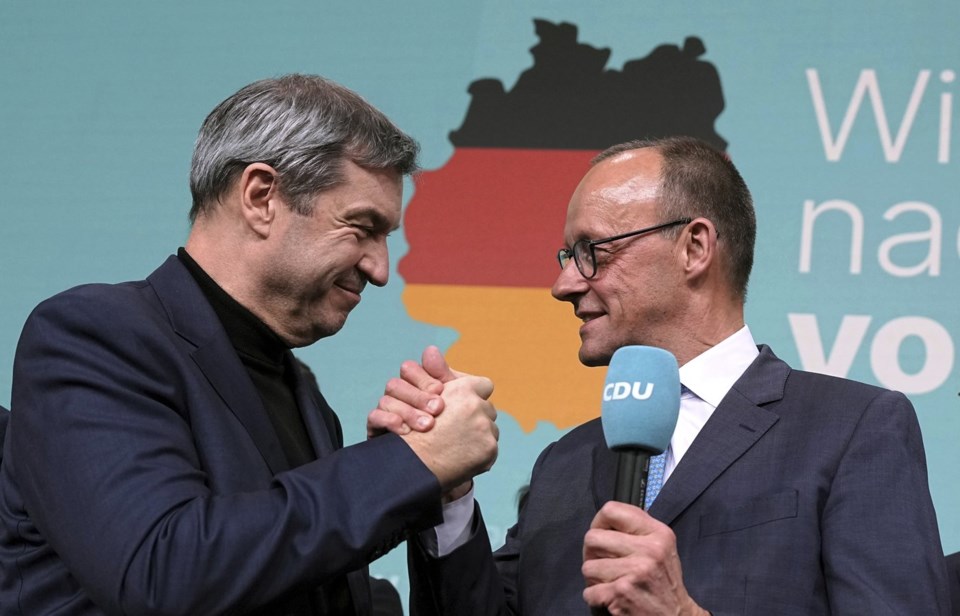BERLIN (AP) — Germany's mainstream conservatives led by Friedrich Merz won Germany’s national election, ensuring that Ukraine has an even stronger supporter in the European Union's largest country and creating hopes for renewal in an economic powerhouse that has been badly battered in recent years.
The far-right, anti-immigrant Alternative for Germany (AfD) surged to become the nation’s second-largest political force, gaining from a backlash against the high numbers of migrants and refugees the nation has absorbed over the past decade and a string of extremist attacks that has shaken its sense of security.
Merz, who is promising to unite Europe in the face of challenges from both Russia and the United States, is expected to become the country’s next leader.
His first comments Monday after his party became the highest vote-getter in national elections were words of support for Ukraine, which is marking the third anniversary of Russia's full-scale invasion.
“Europe stands unwaveringly by Ukraine’s side," Merz posted on X. “Now more than ever, it holds true: We must put Ukraine in a position of strength.”
“For a just peace, the attacked country must be part of peace negotiations,” Merz added, in an apparent rebuke of the Trump administration, which has begun talks with Russia on ending the war that have so far cut out Ukraine and Europe.
Merz will likely partner with the center-left Social Democrats, who suffered a stinging defeat after their coalition collapsed. But the results were seen a rebuke for mainstream parties as AfD notched its best results ever — and the strongest for a far-right party since World War II.
The campaign was dominated by worries about large-scale migration, with Merz also vowing a tough approach, as well as the yearslong stagnation of Europe’s biggest economy. The markets welcomed the victory of the fiscally conservative party, with stocks in major German companies rising Monday morning on hopes for a stable coalition government that could end policy gridlock and tackle the country’s economic problems.
The election also took place against a background of growing uncertainty over the future of Ukraine and Europe’s alliance with the United States.
The results released by the electoral authority showed Merz’s Christian Democrats and the center-left Social Democrats winning a combined majority of seats in the national legislature after small parties failed to make the electoral threshold. Scholz has also supported Ukraine with arms and other aid, but some Western partners have said he could have done more, and faster.
Merz said on election night that he hopes to form a government by Easter at the latest. He has ruled out a coalition with the far-right AfD. For the time being, outgoing Chancellor Olaf Scholz, whose Social Democratic party suffered a major blow, will stay on as head of a caretaker government.
Mainstream parties hold majority as far-right surges
Merz’s conservatives won 208 seats in the 630-seat Bundestag, while AfD won 152. The three parties in the former governing coalition lost seats, with SDP falling to 120 seats and the Greens to 85. The pro-business Free Democrats, which triggered early elections by pulling out of the coalition, failed to reach the 5% of the vote required to win seats.
The Left party got 64 seats, while the left-wing Sahra Wagenknecht Alliance came in just under the 5% hurdle.
AfD was jubilant on Sunday night, with leaders vowing to become the country’s main party in the next election as its appeal expands. The party has established itself as a significant political force in the 12 years since it was founded, but it hasn’t yet been part of any state or national government.
That’s the result of what is often called a “firewall” against AfD. Other parties say they won’t work with AfD, which is under observation by the domestic intelligence agency for suspected right-wing extremism, something the party objects to strongly. Its branches in three eastern states are designated “proven right-wing extremist” groups, which is particularly sensitive in view of Germany’s Nazi past.
Yet a growing number of Germans feel that the mainstream parties have failed to manage the large-scale immigration and other problems in recent years, including responses to the COVID-19 pandemic.
The election took place seven months earlier than originally planned after Scholz’s unpopular coalition collapsed in November, three years into a term that was increasingly marred by infighting. There was widespread discontent and not much enthusiasm for any of the candidates.
Merz says he's ready to face challenges from US and Russia
Merz said Sunday night that his top priority is to unify Europe in the face of challenges coming from the U.S. and Russia. Both U.S. Vice President JD Vance and Trump ally Elon Musk openly supported AfD.
“I have no illusions at all about what is happening from America,” he told supporters. “Take a look at the recent interventions in the German election campaign by Mr. Elon Musk.”
He added that “the interventions from Washington were no less dramatic and drastic and ultimately outrageous than the interventions we have seen from Moscow. So we are under such massive pressure from two sides that my absolute priority now is really to create unity in Europe.”
Germany is the most populous country in the 27-nation European Union and a leading member of NATO. It has been Ukraine’s second-biggest weapons supplier, after the U.S, and will be central to shaping the continent’s response to the challenges of the coming years, including the Trump administration’s confrontational foreign and trade policy.
The conservative leader said that “the most important thing is to reestablish a viable government in Germany as quickly as possible.”
“I am aware of the responsibility,” Merz said. “I am also aware of the scale of the task that now lies ahead of us. I approach it with the utmost respect, and I know that it will not be easy.”
“The world out there isn’t waiting for us, and it isn’t waiting for long-drawn-out coalition talks and negotiations,” he told cheering supporters.
Vanessa Gera, The Associated Press

